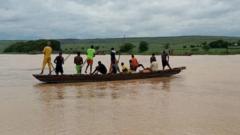British boarding schools are making an impressive entrance to Nigeria, a trend driven by the nation’s affluent class who have historically relied on UK institutions for the education of their children. Last year, Charterhouse inaugurated a primary school in Lagos and is set to open a secondary school this September, followed by Rugby School, which also plans to offer secondary education. Other prestigious names such as Millfield, Wellington School, and Harrow are exploring opportunities within the Nigerian educational landscape.
In light of escalating costs associated with sending children abroad for education, these new schools offer a more financially feasible option for the Nigerian elite. “Having the opportunity to experience the British system in his country of origin is the best of both worlds,” shared Karima Oyede, whose son will transfer to the new Rugby School in Lagos this September. The prevalence of private schools in Nigeria makes the emergence of high-quality British institutions attractive, especially for families wishing to maintain their cultural values while securing international academic recognition.
Ijay Uwakwe-Okoronkwo, an educational consultant in Abuja, emphasizes that while parents seek global standards for their children, they also wish to safeguard their African heritage. Acknowledging the cultural sensitivities surrounding issues such as LGBTQ rights, the British schools in Nigeria are adapting to local norms, consciously avoiding controversial symbols and messages to align with Nigeria's prevailing social attitudes.
The motivation behind this expansion extends beyond providing accessible education; it encompasses the vast reputational advantages of Nigerian students who have consistently excelled in international settings. Mark Brooks from the UK's Department for Business and Trade states, “Nigeria is the gateway to Africa...there is no school I work with that hasn't had a Nigerian student in a leadership position.”
Financially, establishing schools in Nigeria offers significant benefits, as the cost of UK education has risen sharply. While tuition at Charterhouse UK approaches £60,000, fees at their Lagos campus are expected to be around £15,000, a major relief for families facing currency fluctuations. By hiring a mix of British expatriates and local staff, these schools can significantly reduce operational costs.
Despite the promising outlook for British schools in Nigeria, the long-term impact on the country's existing educational landscape remains uncertain. Established institutions like the British International School in Lagos may face new challenges from increased competition, although many experts believe that the educational market could sustain several elite institutions without compromising quality.
This development may also hint at greater opportunities for British universities, as the increasing difficulties students face in pursuing higher education abroad could yield interest in establishing campuses locally. As the educational landscape evolves, many Nigerian parents prioritize a nurturing environment that prepares their children to thrive internationally without sacrificing their cultural roots.
As British-Nigerian families eagerly anticipate the opening of these schools, the timing could serve as an impetus for repatriation, allowing families like those of Oyede to consider returning home with the added comfort of esteemed educational options for their children.





















